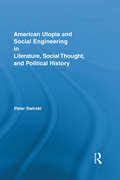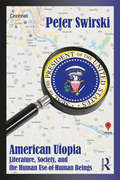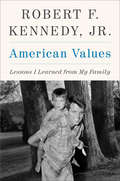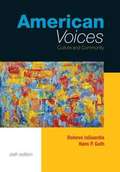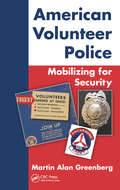- Table View
- List View
American Urban Politics in a Global Age
by James M. Smith Annika Marlen HinzeBringing together a selection of readings that represent some of the most important trends and topics in urban scholarship today, American Urban Politics in a Global Age provides historical context and contemporary commentaries on the economy, politics, culture, and identity of American cities. The eighth edition of this well-rounded and popular urban politics reader maintains the wide variety of reading selections it is known for, as well as many “classics,” while adapting to current events and developments in urban politics, and engaging cities in a post-pandemic world. All-new readings and important editorial commentary include: • Recent political debates about policing, race, and ethnicity in the urban environment; • The impact of climate change on cities, and their roles in mitigating it, as well as preparing for it; • A discussion of gender politics in post-Trump American cities; • A reflection on the increasing importance of private players in city- and metro-politics, from implications for governance, to the growing corporate aspect of smart city initiatives, designed to help urban governments provide important services across cities and metropolitan regions; and • An examination of the COVID-19 pandemic, and its impact on cities, from the initial, devastating outbreak in New York City in March 2020, to recurring shutdowns, life, urban development, and social polarization post-COVID. American Urban Politics in a Global Age remains an approachable scholarly resource for undergraduate and graduate classrooms, as well as a general, wide-ranging scholarly overview of the most important aspects of the field for researchers. It may be taught alongside City Politics: Cities and Suburbs in 21st Century America.
American Urban Politics in a Global Age
by Paul Kantor Dennis R JuddBringing together a selection of readings that represent some of the most important trends and topics in urban scholarship today, American Urban Politics provides historical context and contemporary commentaries on the economy, politics, culture and identity of American cities. This seventh edition examines the ability of highly autonomous local governments to grapple with the serious challenges of recent years, challenges such as the stresses of the lingering economic crisis, and a series of recent natural disasters. Features: Each chapter is introduced by an editor's essay that places the readings into context and highlights their central ideas and findings. Division into three historical periods emphasizes both the changes and continuities in American urban politics over time. The reader is the perfect complement for Judd & Swanstrom's City Politics: The Political Economy of Urban American, 7/e, also available in a new edition (ISBN 0-205-03246-X)
American Utopia and Social Engineering in Literature, Social Thought, and Political History (Routledge Transnational Perspectives on American Literature)
by Peter SwirskiThe United States today is afflicted with political alienation, militarized violence, institutionalized poverty, and social agony. Worst of all, perhaps, it is afflicted with chronic and acute ahistoricism. America insist on ignoring the context of its present dilemmas. It insists on forgetting what preceded the headlines of today and on denying continuity with history. It insists, in short, on its exceptionalism. American Utopia and Social Engineering sets out to correct this amnesia. It misses no opportunity to flesh out both the historical premises and the political promises behind the social policies and political events of the period. These interdisciplinary concerns provide, in turn, the framework for the analyses of works of American literature that mirror their times and mores. Novels considered include: B.F. Skinner and Walden Two (1948), easily the most scandalous utopia of the century, if not of all times; Ken Kesey’s One Flew Over the Cuckoo’s Nest (1962), an anatomy of political disfranchisement American-style; Bernard Malamud’s God’s Grace (1982), a neo-Darwinian beast fable about morality in the thermonuclear age; Walker Percy’s The Thanatos Syndrome (1986), a diagnostic novel about engineering violence out of America’s streets and minds; and Philip Roth’s The Plot Against America (2004), an alternative history of homegrown ‘soft’ fascism. With the help of the five novels and the social models outlined therein, Peter Swirski interrogates key aspects of sociobiology and behavioural psychology, voting and referenda procedures, morality and altruism, multilevel selection and proverbial wisdom, violence and chip-implant technology, and the adaptive role of emotions in our private and public lives.
American Utopia: Literature, Society, and the Human Use of Human Beings
by Peter SwirskiFrom Black Tuesday to the White House, from Plato to Robert Nozick, from Eugene Debs to Richard Nixon, from Peter Cornelis Plockhoy to the hippie communes of the Sixties, from universal basic income to utopian basic income, from proverbial wisdom to multilevel selection, from Big Data to paleomorality, from Prisoner’s Dilemma to social-engineering Israeli kindergartens, from time travel to gene engineering, from the pretzel logic of meritocracy to deaggressing humanity, American Utopia maps the pitfalls and windfalls of social reform in the name of the human use of human beings. Interrogating the assumptions behind four outré utopias by Thomas M. Disch, Bernard Malamud, Kurt Vonnegut, and Margaret Atwood, the book interrogates the assumptions that have historically been central to the utopian project. Whence the seeds of social discontent? Whence our taste for egoism and altruism? For waging war and waging peace? Can we bioengineer human nature to specifications? Should we? Who makes better guardians: humans or machines? And who will guard the guardians?
American Value: Migrants, Money, and Meaning in El Salvador and the United States
by David PedersenOver the past half-century, El Salvador has transformed dramatically. Historically reliant on primary exports like coffee and cotton, the country emerged from a brutal civil war in 1992 to find much of its national income now coming from a massive emigrant workforceOCoover a quarter of its populationOCothat earns money in the United States and sends it home. In American "Value," David Pedersen examines this new way of life as it extends across two places: Intipuci, a Salvadoran town infamous for its remittance wealth, and the Washington, DC, metro area, home to the second largest population of Salvadorans in the United States. aPedersen charts El SalvadorOCOs change alongside American deindustrialization, viewing the Salvadoran migrant work abilities used in new lowwage American service jobs as a kind of primary export, and shows how the latest social conditions linking both countries are part of a longer history of disparity across the Americas. Drawing on the work of Charles S. Peirce, he demonstrates how the defining value formsOComigrant work capacity, services, and remittancesOCoact as signs, building a moral world by communicating their exchangeability while hiding the violence and exploitation on which this story rests. Theoretically sophisticated, ethnographically rich, and compellingly written, "American Value" offers critical insights into practices that are increasingly common throughout the world.
American Values: Lessons I Learned from My Family (Identification And Value Guide Ser.)
by Robert F. Kennedy Jr.With rich detail, compelling honesty, and a storyteller’s gift, RFK Jr. describes his life growing up Kennedy in a tumultuous time in history that eerily echoes the issues of nuclear confrontation, religion, race, and inequality that we confront today.In this powerful book that combines the best aspects of memoir and political history, the third child of Attorney General Robert Kennedy and nephew of JFK takes us on an intimate journey through his life, including watershed moments in the history of our nation. Stories of his grandparents Joseph and Rose set the stage for their nine remarkable children, among them three U.S. senators—Teddy, Bobby, and Jack—one of whom went on to become attorney general, and the other, the president of the United States. We meet Allen Dulles and J. Edgar Hoover, two men whose agencies posed the principal threats to American democracy and values. Their power struggles with the Kennedys underpinned all the defining conflicts of the era. We live through the Cuban Missile Crisis, when insubordinate spies and belligerent generals in the Pentagon and Moscow brought the world to the cliff edge of nuclear war. At Hickory Hill in Virginia, where RFK Jr. grew up, we encounter the celebrities who gathered at the second most famous address in Washington, members of what would later become known as America’s Camelot. Through his father’s role as attorney general we get an insider’s look as growing tensions over civil rights led to pitched battles in the streets and 16,000 federal troops were called in to enforce desegregation at Ole Miss. We see growing pressure to fight wars in Southeast Asia to stop communism. We relive the assassination of JFK, RFK’s run for the presidency that was cut short by his own death, and the aftermath of those murders on the Kennedy family.These pages come vividly to life with intimate stories of RFK Jr.’s own experiences, not just with historical events and the movers who shaped them but also with his mother and father, with his own struggles with addiction, and with the ways he eventually made peace with both his Kennedy legacy and his own demons. The result is a lyrically written book that is remarkably stirring and relevant, providing insight, hope, and steady wisdom for Americans as they wrestle, as never before, with questions about America’s role in history and the world and what it means to be American.
American Vandal
by Roy MorrisUnintimidated by Old World sophistication or travel to undeveloped parts of the globe, Mark Twain spent a surprising amount of time outside the continental United States. Roy Morris, Jr. focuses on the dozen years he lived overseas and the books he wrote encouraging middle-class Americans to follow him around the world, at the dawn of mass tourism.
American Veda: From Emerson and the Beatles to Yoga and Meditation How Indian Spirituality Changed the West
by Philip GoldbergIn February 1968 the Beatles went to India for an extended stay with their new guru, Maharishi Mahesh Yogi. It may have been the most momentous spiritual retreat since Jesus spent those forty days in the wilderness. With these words, Philip Goldberg begins his monumental work, American Veda, a fascinating look at India’s remarkable impact on Western culture. This eye-opening popular history shows how the ancient philosophy of Vedanta and the mind-body methods of Yoga have profoundly affected the worldview of millions of Americans and radically altered the religious landscape. What exploded in the 1960s actually began more than two hundred years earlier, when the United States started importing knowledge as well as tangy spices and colorful fabrics from Asia. The first translations of Hindu texts found their way into the libraries of John Adams and Ralph Waldo Emerson. From there the ideas spread to Henry David Thoreau, Walt Whitman, and succeeding generations of receptive Americans, who absorbed India’s “science of consciousness” and wove it into the fabric of their lives. Charismatic teachers like Swami Vivekananda and Paramahansa Yogananda came west in waves, prompting leading intellectuals, artists, and scientists such as Aldous Huxley, Joseph Campbell, Allen Ginsberg, J. D. Salinger, John Coltrane, Dean Ornish, and Richard Alpert, aka Ram Dass, to adapt and disseminate what they learned from them. The impact has been enormous, enlarging our current understanding of the mind and body and dramatically changing how we view ourselves and our place in the cosmos. Goldberg paints a compelling picture of this remarkable East-to-West transmission, showing how it accelerated through the decades and eventually moved from the counterculture into our laboratories, libraries, and living rooms. Now physicians and therapists routinely recommend meditation, words like karma and mantra are part of our everyday vocabulary, and Yoga studios are as ubiquitous as Starbuckses. The insights of India’s sages permeate so much of what we think, believe, and do that they have redefined the meaning of life for millions of Americans—and continue to do so every day. Rich in detail and expansive in scope, American Veda shows how we have come to accept and live by the central teaching of Vedic wisdom: “Truth is one, the wise call it by many names.”
American Venice
by Lewis F. FisherIn American Venice: The Epic Story of San Antonio's River, Lewis F. Fisher uncovers the evolution of San Antonio's beloved River Walk. He shares how San Antonians refused to give up on the vital water source that provided for them from before the city's beginnings. In 1941 neglect, civic uprisings, and bursts of creativity culminated in the completion of a Works Projects Administration project designed by Robert H. H. Hugman.The resulting River Walk languished for years but enjoyed renewed interest during the 1968 World's Fair, held in San Antonio, and has since become the center of the city's cultural and historical narrative."The real story [of the River Walk] is a bit less Hollywood but far more interesting . . . With a growing number of cities facing issues of water supply, urban runoff, flooding, and ways of rebuilding better after a disaster, the San Antonio River Walk remains a great example of getting it right," writes Irby Hightower, co-chair of the San Antonio River Oversight Committee.In this updated and expanded edition of River Walk: The Epic Story of San Antonio's River, Fisher offers more fascinating stories about the River Walk's evolution, bringing to light new facts and sharing historical images that he has since discovered. The update includes information about the Museum and Mission Reaches, two expansions of the River Walk that are vital to San Antonio's continued growth as the seventh largest city in the country.Fisher starts his story with the first written records of the river, in the 1690s, and continues through the 1800s and the flood of 1921, to debates over transforming the river and its eventual role as the crown jewel of Texas, and finally to its recent expansion. More than a community attraction, the River Walk's banks are also a giant botanical garden full of plants and trees. Indeed, the American Society for Horticulture has named the River Walk a Horticultural Landmark. As Fisher says, the River Walk "remains a work in progress, one forever precarious and unfinished yet standing before the world as a triumph of enterprise and human imagination."
American Veterans on War: Personal Stories from WW II to Afghanistan
by Elise Forbes TrippThe United States is embroiled in conflicts in Iraq and Afghanistan-wars that seem as far from Americans' understanding as they are distant from our shores.With American Veterans on War, Elise Forbes Tripp brings our current wars and their predecessors home in the words of 55 veterans aged 20 to 90. The veterans raise questions about when wars are worth fighting, what missions can and can't be won, and the costs and benefits of US intervention, both around the world and domestically. Recent veterans tell wrenching stories of coping with hostile forces without uniforms, of not knowing who is friend or foe, and of the lasting traces of combat once they've returned home.American Veterans on War provides a sweeping overview of three-quarters of a century of American wars, properly grounding that history in the words of the men and women whose bodies were on the line.
American Victorian Costume in Early Photographs
by Priscilla Harris DalrympleOver 280 rare photographs document the clothing of ordinary men, women, and children from the 1840s through the 1890s, in what appears to be their Sunday best. Bustles, hoops, pantalets, shirtwaists, top hats, waistcoats, bowlers, other Victorian-era attire, as well as hairdressing and tonsorial styles. Introduction to fashions of each decade.
American Victory
by Henry Cejudo"Compelling. . . American Victory represents the triumph of the human spirit. " --Los Angeles Times Henry Cejudo's remarkable journey follows an unlikely hero, the son of illegal immigrants, from the mean streets of South Central LA to the glory of the Beijing Olympics. The first American in sixteen years to win the gold medal in freestyle wrestling and the youngest American gold medalist ever in this event, Henry's grit, passion, and resolve on display in China was a culmination of a life spent fighting-both on and off the mat. American Victory is his poignant and powerful memoir of how he rose above the statistics and dangers to become a winner-and a hero that embodies all that's best and most hopeful in the American dream. .
American Vikings: How the Norse Sailed into the Lands and Imaginations of America
by Martyn WhittockA vivid and illuminating new history—separate fact from fiction, myth from legend—exploring the early Vikings settlements in North America.Vikings are an enduring subject of fascination. The combination of adventure, mythology, violence, and exploration continues to grip our attention. As a result, for more than a millennium the Vikings have traveled far and wide, not least across the turbulent seas of our minds and imaginations. The geographical reach of the Norse was extraordinary. For centuries medieval sagas, first recorded in Iceland, claimed that Vikings reached North America around the year 1000. This book explores that claim, separating fact from fiction and myth from mischief, to assess the enduring legacy of this claim in America. The search for &“American Vikings&” connects a vast range of different areas; from the latest archaeological evidence for their actual settlement in North America to the myth-making of nineteenth-century Scandinavian pioneers in the Midwest; and from ancient adventurers to the political ideologies in the twenty-first century. It is a journey from the high seas of a millennium ago to the swirling waters and dark undercurrents of the online world of today. No doubt, the warlike Vikings would have understood how their image could be &“weaponized.&” In the same way, they would probably have grasped how their dramatic, violent, passionate, and discordant mythologies could appeal to our era and cultural setting. They might, though, have been more surprised at how their image has been commercialized and commodified. A vivid new history by a master of the form, American Vikings explores how the Norse first sailed into the lands, and then into the imaginations, of America.
American Violence
by Richard HofstadterWith eyewitness accounts and contemporary reports--linked together by succinct analytical commentaries--Richard Hofstadter and his young collaborator, Michael Wallace, have created a superb documentary reader that is, in effect, a history of violence in America through four centuries. Here, as experienced by men and women who lived through them, are not only the familiar, chilling eruptions--Harper's Ferry; the Civil War draft riot in New York; Homestead; Centralia; the Detroit ghetto; the assassinations of Lincoln, Malcolm X, and Robert Kennedy--but also less commonly remembered episodes, such as the New York slave riots of 1712, the doctors' riot of 1788, vigilante terror in Montana, the anti-Chinese riot in Los Angeles in 1871, and the White League coup d'état of 1874 in New Orleans. In his extensive introduction, Richard Hofstadter shows how, in the face of the record, Americans have had an extraordinary ability to persuade themselves that they are among the best-behaved and the best-regulated of peoples. With more than one hundred entries, the editors have documented and put into perspective the thread of violence in American history whose rediscovery--as Hofstadter suggests--will undoubtedly be one of the most important intellectual legacies of the 1960's. The book clearly demonstrates, even as the reader comes to grips with long-eluded truths, that America's consistent history of violence has not yet breached beyond hope of restoration our long record of basic political stability, that most social reforms in the United States have been brought about without violence.
American Visa
by Marcelo RiosecoUna novela hilarante y sarcástica, con un estilo exquisito y rabiosamente contemporáneo, que narra la experiencia de un «latino legal» en Estados Unidos. Marce está a punto de cumplir con su sueño americano. Una novia norteamericana, un prometedor viaje de Los Ángeles a Filadelfia, una beca para estudiar en la Universidad de Pensilvania, una nueva vida lejos del horroroso Chile. Pero el sueño no dura demasiado. Nada más llega a Estados Unidos es abandonado por su novia, sus compañeros de postgrado resultan insoportables, es víctima de una estafa por internet, se queda solo. Estados Unidos resulta ser un desolado y absurdo desierto donde los sueños y los comportamientos están rígidamente ordenados. La única solución es seguir viajando seguir rodando para tratar de volver al mundo de partida. Junto con su amigo argentino, Simón Alejandro -otro latinoamericano extraviado en la universidad-, decide emprender un viaje desenfadado y poético por ese enorme país de carreteras interminables. Con una ironía sin igual y una prosa de inaudita fuerza, esta primera novela de Marcelo Rioseco -premio de poesía Revista de Libros- narra la historia de un desengaño amoroso en un mundo donde los límites se difuminan, como las culturas, las identidades, los idiomas y las extravagantes existencias de los personajes que se entrecruzan con esta inusitada historia. Un libro exquisito y rabiosamente contemporáneo.
American Visions: The Epic History of Art in America
by Robert HughesWriting with all the brilliance, authority, and pungent wit that have distinguished his art criticism for Time magazine and his greatly acclaimed study of modern art, The Shock of the New, Robert Hughes now addresses his largest subject: the history of art in America. The intense relationship between the American people and their surroundings has been the source of a rich artistic tradition. American Visions is a consistently revealing demonstration of the many ways in which artists have expressed this pervasive connection. In nine eloquent chapters, which span the whole range of events, movements, and personalities of more than three centuries, Robert Hughes shows us the myriad associations between the unique society that is America and the art it has produced: "O My America, My New Founde Land" explores the churches, religious art, and artifacts of the Spanish invaders of the Southwest and the Puritans of New England; the austere esthetic of the Amish, the Quakers, and the Shakers; and the Anglophile culture of Virginia. "The Republic of Virtue" sets forth the ideals of neo-classicism as interpreted in the paintings of Benjamin West, John Singleton Copley, and the Peale family, and in the public architecture of Thomas Jefferson, Benjamin Latrobe, and Charles Bulfinch. "The Wilderness and the West" discusses the work of landscape painters such as Thomas Cole, Frederick Church, and the Luminists, who viewed the natural world as "the fingerprint of God''s creation," and of those who recorded America''s westward expansion--George Caleb Bingham, Albert Bierstadt, and Frederic Remington--and the accompanying shift in the perception of the Indian, from noble savage to outright demon. "American Renaissance" describes the opulent era that followed the Civil War, a cultural flowering expressed in the sculpture of Augustus Saint-Gaudens; the paintings of John Singer Sargent, Mary Cassatt, and Childe Hassam; the Newport cottages of the super-rich; and the beaux-arts buildings of Stanford White and his partners. "The Gritty Cities" looks at the post-Civil War years from another perspective: cast-iron cityscapes, the architecture of Louis Henri Sullivan, and the new realism of Thomas Eakins, Winslow Homer, the trompe-l''oeil painters, and the Ashcan School. "Early Modernism" introduces the first American avant garde: the painters Arthur Dove, Marsden Hartley, Joseph Stella, Charles Demuth, Charles Sheeler, and Georgia O''Keeffe, and the premier architect of his time, Frank Lloyd Wright. "Streamlines and Breadlines" surveys the boom years, when skyscrapers and Art Deco were all the rage . . . and the bust years that followed, when painters such as Edward Hopper, Stuart Davis, Thomas Hart Benton, Diego Rivera, and Jacob Lawrence showed Americans "the way we live now. " "The Empire of Signs" examines the American hegemony after World War II, when the Abstract Expressionists (Jackson Pollock, Willem de Kooning, Mark Rothko, et al. ) ruled the artistic roost, until they were dethroned by Jasper Johns, Robert Rauschenberg, the Pop artists, and Andy Warhol, while individualists such as David Smith and Joseph Cornell marched to their own music. "The Age of Anxiety" considers recent events: the return of figurative art and the appearance of minimal and conceptual art; the speculative mania of the 1980s, which led to scandalous auction practices and inflated reputations; and the trends and issues of art in the 90s. Lavishly illustrated and packed with biographies, anecdotes, astute and stimulating critical commentary, and sharp social history, American Visions was originally published in association with a new eight-part PBS television series. Robert Hughes has called it "a love letter to America. " This superb volume, which encompasses and enlarges upon the series, is an incomparably entertaining and insightful contemplation of its splendid subject.
American Visions: The United States, 1800-1860
by Edward L. Ayers“An inspiring book.… American Visions beautifully shows how remarkably resilient dreams of a better republic remained even in the darkest of times.” —Christoph Irmscher, Wall Street Journal A revealing history of the formative period when voices of dissent and innovation defied power and created visions of America still resonant today. With so many of our histories falling into dour critique or blatant celebration, here is a welcome departure: a book that offers hope as well as honesty about the American past. The early decades of the nineteenth century saw the expansion of slavery, Native dispossession, and wars with Canada and Mexico. Mass immigration and powerful religious movements sent tremors through American society. But even as the powerful defended the status quo, others defied it: voices from the margins moved the center; eccentric visions altered the accepted wisdom, and acts of empathy questioned self-interest. Edward L. Ayers’s rich history examines the visions that moved Frederick Douglass, Margaret Fuller, the Native American activist William Apess, and others to challenge entrenched practices and beliefs. So, Lydia Maria Child condemned the racism of her fellow northerners at great personal cost. Melville and Thoreau, Joseph Smith and Samuel Morse all charted new paths for America in the realms of art, nature, belief, and technology. It was Henry David Thoreau who, speaking of John Brown, challenged a hostile crowd "Is it not possible that an individual may be right and a government wrong?" Through decades of award-winning scholarship on the Civil War, Edward L. Ayers has himself ventured beyond the interpretative status quo to recover the range of possibilities embedded in the past as it was lived. Here he turns that distinctive historical sensibility to a period when bold visionaries and critics built vigorous traditions of dissent and innovation into the foundation of the nation. Those traditions remain alive for us today.
American Voices of Dissent: The Book from XXI Century, a Film by Gabrielle Zamparini and Lorenzo Meccoli
by William Blum Garbriele Zamparini Lorenzo Meccoli"Absolutely indispensable! An important resource in the struggle." Ken Loach, film director "Your book is just what we need at time when the American Left gets no coverage in the world's press and yet remains the hope for America and the world." Tony Benn, President, Stop the War Coalition "[This book] challenges the simplistic perception of Americans as SUV-driving, war-loving couch potatoes. There's a movement for peace and justice and this book gives it a voice." Mickey Z., writer With contributions by five Nobel Peace Prize winners, former government officials, scholars, religious leaders, journalists, activists, and prominent cultural figures, the documentary film XXI Century explores American reactions to recent global events captured through the lens of interviews and political rallies. This book presents selected excerpts from the filming of prominent U.S. citizens voicing their view on Bush administration policies in the century. These events include the much-contested 2000 election, the September 11, 2001, attacks, the impact of the USA Patriot Act, the accelerated growth of peace movements, the recruitment of U.S. soldiers, U.S. policy and attitudes toward the Middle East, sanctions and war in Iraq, and human rights violations. The speakers also consider how the rise of media spectacle and punditry at the expense of quality journalism inhibits the ability of Americans to react to these events as informed citizens. The voices of Americans, both ordinary and famous, resonate with passion and urgency in response to the injustice and far-reaching effects of the current U.S. foreign policy. American Voices of Dissent highlights the other side of the story and makes a case for global solidarity against U.S. imperialism.
American Voices of World War I: Primary Source Documents, 1917-1920
by Martin Marix EvansUsing original documents from the U.S. Army Military History Institute (including extracts from letters and diaries of serving soldiers, as well as from official reports and papers), this book recalls the experiences of Americans who fought in the First World War. Individual chapters cover different periods, from Enlistment to Victory, in a chronological fashion. The book also features topics such as weaponry, medical services and entertainment.
American Voices: Culture and Community (Sixth Edition)
by Dolores Laguardia Hans P. GuthAmerican Voices: Culture and Community, Sixth Edition, is an 800 page Freshman English reader compiled and written by Dolores LaGuardia and Hans P. Guth. The authors' description of this edition reads as follows: This thematic reader addresses the diversity of American culture by featuring over 100 provocative readings and images from a broad range of authorial voices. American Voices: Culture and Community helps students read critically and develop their own voices with helpful apparatus for each reading and engaging forums and writing workshops at the end of each chapter. NEW TO THIS EDITION Over 40 New Readings. These new readings from a diverse group of authors are on such contemporary. high-interest topics as growing up between cultures. high-stakes testing for students. gay marriage, outsourcing. and terrorism. New Visual Literacy Thread. The first chapter introduces students to concepts of visual literacy and provides guides for different ways to think about visuals. Following this first chapter. each chapter begins with a visual literacy exercise. Expanded Writing Workshops. These self-contained units at the end of each chapter now feature more student writing with supportive comments. More Context for Readings. New expanded headnotes give students more contextual information for each reading, so students can think critically about purpose and audience. New "Other Voices" boxes. Throughout the book. new "Other Voices" give context and alternate views to the selections in t ie~rnfrofogy T+~es e _ s appear at the end of select readings. Now powered by eatalylst 2.0
American Voices: Literature
by Perfection LearningProvide your students a diverse set of texts, both classic and contemporary to probe relevant themes, develop literary analysis skills, and generate lively discussions. <p><p> The American Voices anthology supports common eleventh grade literature requirements and engages students using a literary lens for every selection. The Interactive Edition provides power digital tools to ensure text comprehension, build close reading skills, and increase collaboration.
American Voices: Original Documents, Speeches, Poems, And Stories From American History
by Ray NotgrassAMERICAN VOICES Original Documents, Speeches, Poems, and Stories from American History
American Volunteer Group 'Flying Tigers' Aces
by Jim Laurier Terrill ClementsThe American Volunteer Group, or 'Flying Tigers', have remained the most famous outfit to see action in World War II. Manned by volunteers flying American aircraft acquired from the British, the AVG fought bravely in the face of overwhelming odds in China and Burma prior to the US entry into World War II. Pilots such as 'Pappy' Boyington, R T Smith and John Petach became household names due to their exploits against the Japanese Army Air Force. The AVG legend was created flying the Curtis P-40 Tomahawk and Kittyhawk. This volume dispels the myths surrounding the colours and markings worn by these famous fighters.
American Volunteer Police: Mobilizing for Security
by Martin Alan GreenbergToday, it is estimated there are over 200,000 volunteers in police work throughout the United States. Although the need for such volunteers has never been greater, there is a lack of published materials regarding the nature of volunteer police work and how qualified citizens may augment police services. American Volunteer Police: Mobilizing for Sec
American Voter Turnout: An Institutional Perspective (Transforming American Politics (4th Edition))
by David HillUsing a combination of existing and original research, this new text provides a simple explanation for the low turnout in American elections: rather than creating an environment conducive to participation, the institutional arrangements that govern structure participation, representation, and actual governance in the United States create an environment that discourages widespread participation. To explore this argument, the author examines the origins and development of registration laws, single-member districts, such as the Electoral College, and the separation of powers and the impact these institutions have on turnout levels in American national elections. To this end, the text employs a narrative discussing the impact of institutions on turnout in the United States and across nations, supported with extensive yet accessible data analysis. Hill not only provides students with explanations for the low turnout characteristic of American elections, but also demonstrates the powerful impact of institutions on political life.


